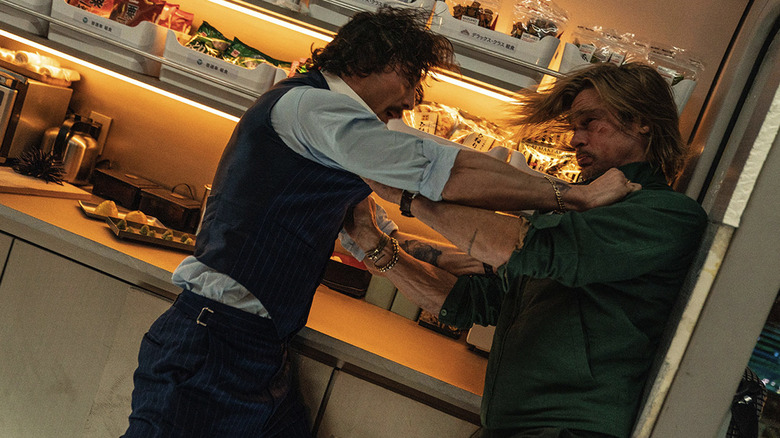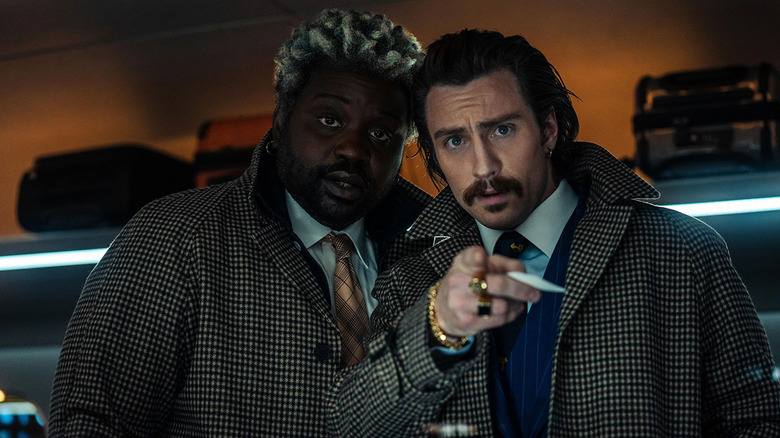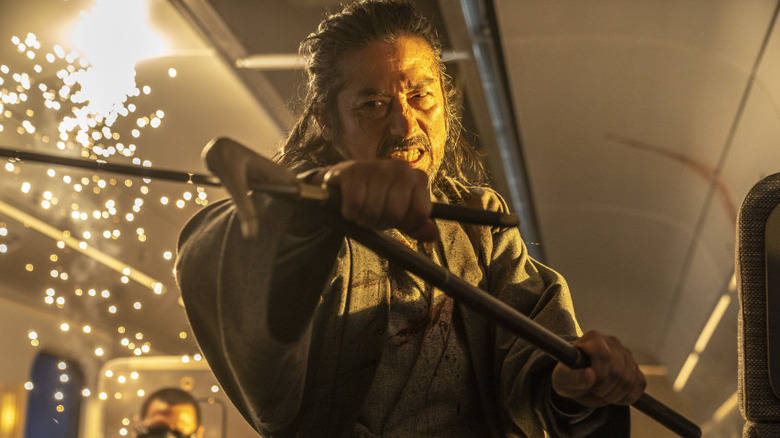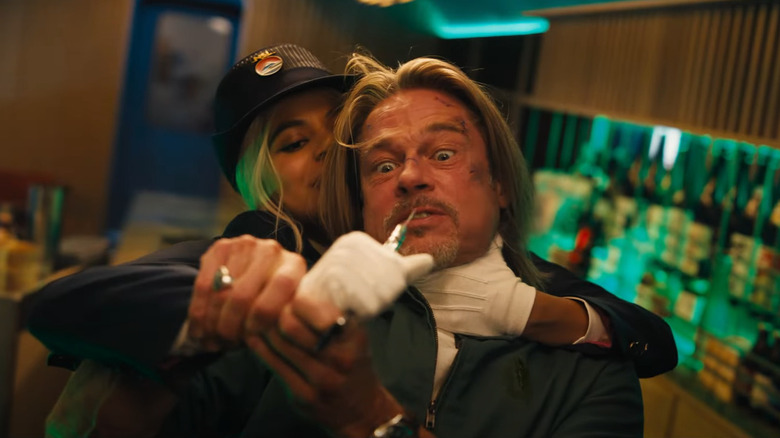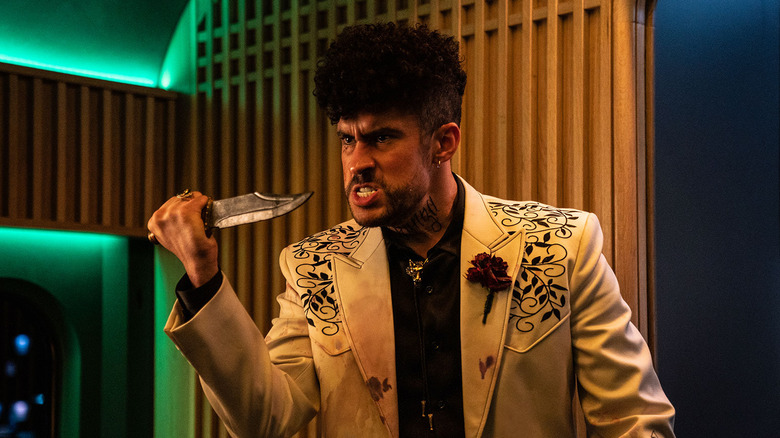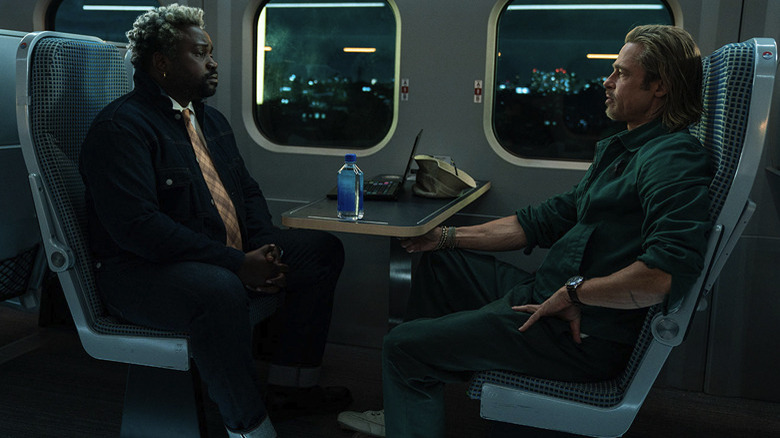Bullet Train Composer Dominic Lewis Wanted The Score To Have A 'Concept Album Mentality' [Interview]
With an array of colorful characters and set pieces, Dominic Lewis rarely had to hit the breaks when it came to composing the score for "Bullet Train," allowing him the ability to explore a variety of creative impulses. As he told us, a few ideas might've gone too far (such as a fantastic-sounding spin on the "Thomas the Tank Engine" theme song), but he's reeling from the creative freedom he had scoring director David Leitch's film.
Lewis, who also scored "DuckTales," "The Man in the High Castle," and "The King's Man," put together a lively score for the "Bullet Train," which surprisingly, only lacks a theme for its protagonist, Ladybug (played by Brad Pitt). Everyone but the assassin aboard the bullet train gets a theme. For Lewis, that omission was mostly for storytelling reasons. Recently, the composer told us why the film was his "the best yet of my career."
Note: Spoilers for "Bullet Train" ahead. This interview has been lightly edited for clarity and brevity.
'It's amazing, the fact that I brought this song to the table that was a West Ham United song'
I imagine one of the joys as a composer was scoring all these colorful characters, defining them all with music, and composing their themes. Was it just an embarrassment of riches as a composer?
Nothing was off the table. Any genre, any culture, anything was up for grabs. I wanted to go beyond the script for each character and figure out where they are from. What's their background? What would they be listening to? I used that as my barometer of where I eventually would end up with each character. For example, with Lemon (Bryan Tyree Henry) and Tangerine (Aaron Taylor-Johnson), I'm a similar age to both of them. I'm from England. The first characters I dove into were those guys, because it was close to me. Eventually, I tackled a scene that was late on in the movie.
There's the emotional sequence between Lemon and Tangerine towards the end of the movie. I didn't want to approach it in a way that, as a film composer, you normally would. You'd access the emotion, you'd bring the strings out and you'd pull the heartstrings of the audience. How do I approach this in a different way? Earlier on in getting dailies, I noticed that Tangerine had a West Ham United sticker on the back of his phone. I was like, "Ooh, the West Ham United song." All the fans will always sing "I'm Forever Blowing Bubbles" at games and in the pubs — that's their song. Well, what if I do a version of that, a very emotional version of that, that would link these two characters together? I did it, I sent it to David and he loved it, but he was like, "Wow, but it's got to pay off, how do I work this into the story? How do we lay pipe for this to pay off at this moment?"
It's amazing, the fact that I brought this song to the table that was a West Ham United song, and then he loved it so much that he's then working it into the story and making it Lemon and Tangerine's theme. We have the version at the beginning of the film with the 17 kills when they're counting to the camera, how many people they're killing, and then you've got the Cockney Rejects' punk version of it. It became a whole thing from this one little idea from seeing the phone and the West Ham United sticker. That's an example of how far I was going beyond the character.
For Prince (Joey King), she's Russian but she studied in England. I was drawing from more English influences, but also trying to keep it a little Russian. She's very charming, but also she's completely crazy and sadistic. So her theme took on two sides. You've got the fun aspect of it with a lot of drums, a lot of band-orientated things — gritty, almost, because the '90s is coming back now. That really feels like Prince, who I think would be Gen-Z. So it's got that '90s sort of drums and bass and some vocal stuff. On the other hand, it gets very serious. Almost the darker side with the '90s trip hop, just trippy and sadistic and evil. Those two things normally exist separately. But then a few moments in the movie, they come together, so that's Prince.
I could go through every single character, but I was trying to go beyond everyone and really dive into who they are, and what they are beyond the script. I think that helped because everyone does such an amazing job anyway, in terms of acting, it just sprinkled that extra layer on it.
I do want to cover themes for other characters, but as a composer who's worked on a lot of comedies, like "Rough Night" and "Fist Fight," how did your previous experience scoring comedies help with scoring the humor in "Bullet Train?"
It's been invaluable. Oftentimes the best thing to do is to leave it alone and not actually score it. I think the way that I was able to help with this is it is a tonal thing. It being an extremely violent movie, it doesn't feel like it because of the comedy and the tone we set up. Actually, initially, a lot of the stuff for White Death (Michael Shannon) and Prince didn't have that lighter, fun side. After the first preview, there was a whole conversation of, tonally, we need to lighten the bad guys up a bit and get the popcorn vibes going. The music had to move. I think the more serious version of White Death was bogging it down a little bit, not moving the story along.
That change was a nice challenge that helps the comedy and Prince's interactions with White Death as well. It was switching between orchestral and the perfect needle drop, which essentially was my pitch to Dave at the beginning of this whole thing, that I want to come up with a score that sounds like the perfect needle drop. You found a song that worked around everything you need to work around — comedy, drama, whatever we're trying to say with the characters.
I think it's actually more my experience with writing songs and the record business that helped me work around the comedy on this, because I was approaching it much more from a needle drop standpoint. If I mute these stems of these songs, then there'll be a layer that can lie under the comedy and we're not all over it and we're letting it breathe. Obviously, there are slapstick moments, the quiet car, and stuff. That's very obviously being Mickey Mouse about it and scoring everything for that whole nod to that era. But most of the time, with the witty stuff from the back and forth, it was more about staying out. The timing, the rapport, it's so great that I didn't have to do much. It was creating the tone around that and bridging it into more serious stuff or more action-based stuff.
When I pitched this, what if I was going through my vinyl record collection and found this old album from the '70s? What if I used that as samples and I based the score around that? Obviously, I was coming up with the original sample of the album, but that was the goal. Rather than doing a traditional hybrid orchestral that sounds like film music, I think it helped with the tone of the movie, especially the comedy. Even though it was score, it still feels like a song. It's that concept album mentality.
'I did this massive Puccini-esque version of Thomas the Tank Engine at one point'
With the orchestra, how big did you want to go with the film's climax?
It was a very conscious decision. Even in recording it, everything up to that moment where White Death shows up on the platform, we recorded everything in Capitol [Records, studio] B with a very small ensemble, very '70s based, very retro style recording. Then everything that I wrote beyond that was recorded in Sony with this huge orchestra, just so you know, even subconsciously, you feel it get bigger, because it did get bigger.
Although you don't necessarily know that there's an overt change in the sound, you feel everything get a bit beefier, and right from the start, I knew that Dave wanted to use "Holding Out for a Hero" [performed by Miki Asakura] in that first battle, as it were, with the White Death as they get on the train. I mean, that song is so epic anyway. It sets the bar, and I have to take it up a notch from there. That's why I wanted to save the big orchestra to the end, where it goes a little bit more traditional in the film scoring sense.
Still, it has all those elements that have been used in reels one, two, three, four. It was keeping the sound of the movie in the tone of the movie. I mean, bluntly, it just got physically bigger. I just added more players and added more stuff and got bigger with the harmony and bigger with the tunes. It just took it off the rails.
There's usually such an elegance to the fight scenes in David's work, especially the one-on-one combat. How did you want to emphasize his elegant or even chaotic approach to action?
The collaborative experience with David is second to none. I was made to feel I was not just a composer and a musician, but a filmmaker with David. He makes you feel so comfortable and encourages you to swing for the fences. Oftentimes, when you get a blank canvas, you go, "It's a blank canvas, but there's a heavy influence of where you're supposed to be putting the paints." With David, it's like, "Whatever you think it should be, show it to me. If I don't like it, I'll say it, and if I do, we'll roll." We rolled for most of it. There were a couple of times when I went too far. I did this massive [Giacomo] Puccini-esque version of "Thomas the Tank Engine" at one point.
Really?
He was like, "I love it, but one, we are never going to be able to license that. And two, it's probably not quite right." That was the only moment where he was like, "I think you swung a little too hard on that." Other than that, there were challenges towards the end, because being a film composer at heart, you tend to want to score things in that long arc and those last reels you want to combine everything and help everything, help those intercuts, smooth the intercuts out. David was like, "No, no, no, I want this end reel to be like vignettes and bring back to the intimacy of Ladybug and Lemon in the carriage, and then back to the fight with the Elder (Hiroyuki Sanada) and the White Death." He wanted to feel that shift as opposed to what you'd normally do and smooth that all over and bring everyone to the end. He wanted that constant battle, and it all comes together at the end. It was cool, tapping into his way of doing things.
Where would your take on "Thomas the Tank Engine" theme have been in the movie?
Initially, the sequence with Ladybug and Lemon and the whole "I've got another brother now" sequence, and then he is like "f*** no." As Lemon dives out of the train, as he's falling, this huge "Thomas the Tank Engine" version happens. My head was like, "Think of the craziest thing you possibly can." I swung for the fences and it was epic, but it took you out of it too much. Because it was so dripped in classical orchestration, it wasn't overt enough to people. It was an Easter egg that some people would get, but it wasn't enough of an Easter egg for people to go, "Oh my God, it's Thomas the Tank." I think that's why it wasn't quite working for him. I mean, it was massive. I just watched David's face kind of go, hmm.
Did you at least get to record it with the large orchestra?
No, that only lives in demo format, unfortunately. I never got to record it, but that would've been quite something. But no, it never made it. It's on the cutting room floor, unfortunately.
'You'd think your main character would have the main theme, but it wasn't like that'
How did you come up with Ladybug's theme?
Brad's performance was so perfect that it was hard to come up with something, especially when you establish this character to "Stayin' Alive" [performed by Avu-Chan]. For me, it was maybe the biggest challenge, because everything I threw at him musically wasn't quite working. There were elements of it that would work. I even had some knee-jerk swing ideas at some point and tried to use "Stayin' Alive" as an inspiration and ran with that.
In the end, musically, he has a few moments, but he's sort of that linchpin of almost all the other characters working around him and, like, how are their themes? How do they change when they're interacting with him? Now, eventually, I came up with working with the Zen aspect of it and I came up with this weird vocal chanting, almost a kind of meditation, and some upright bass stuff, because it's very hippie.
I came up with this vocal thing, and as you probably heard, the vocals are very prominent in the score. I think that was important as well, trying to make the score and the songs meld together well. There are a lot of little vocal ideas, but with Ladybug's character, it was the vocal idea with the upright bass, almost tapping into the burning man element of his character. Even the drum loops are a little bit cool and maybe inspired by certain substances, and that's where I ended up with him.
Oftentimes trying to score him was pushing on the comedy, and it was leaving him dry. It became about letting him be that amazing performance — that was often the best way to deal with it. He sort of takes on the "Fate" theme. It's sort of passed on to him from the Elder. It's strange. It's definitely not a normal way of doing things. You'd think your main character would have the main theme, but it wasn't like that. I think it works, leaving him be and letting other people interact with him, and their theme changes because of the interaction with him.
Is it daunting, too, scoring a Brad Pitt performance?
It's daunting, but less was more with him. You want to give him his due. You don't want to do too much where you are trying too hard. It's almost like if you meet them and you're like, you don't want to say too much, but you don't want to say too less. It's a difficult situation. Meeting a celebrity is similar to scoring the actor on stage. But I mean, he's such a big deal and he's so great.
I do have this one little figure that keeps coming back and it's almost more of a tension motif than it is his, but oftentimes he's put in his situations where he is moving the tension forward. So, there's this chord that's almost a train bell, that was one of the first things I came up with. Again, I was trying to take inspiration from "Stayin' Alive," that funk piano. It's this one chord that's almost like a train bell. It became a big part of his character and the scenes he's moving forward. It's one of those chords where you go, "Okay, I've got to pay attention now because there's a story here."
'I wanted a celebration of everyone, really, musically'
How did the location — not only the train itself, but Japan — influence your choices?
I didn't want to go there in terms of using traditional Japanese instruments. The closest I got was a Spanish guitar that I bought that was made by a very famous Japanese luthier. That was the closest connection I wanted, really. I didn't want to do, "We're in Japan, we've got Japanese characters, and I'm going to do Japanese music." It's a very global film. It's a celebration of all cultures. It's set in Japan, but it's this coming together, musically, of lots of different genres and lots of different cultural inspirations. Especially for The Elder, I relied more on that '70s record idea. That was their sound. It was more mellotrons and old-sounding recorded guitars.
The closest I got was the traditional way of singing in Japanese culture called "enka singing." I got an enka singer to come in and she sings the "Fate" theme, which is very much there. The fate aspect of the movie is very much The Elder sound. Going back to that '70s vinyl record that I found, that was the first thing I wrote when Dave sent me the script and he said, "I want you to write suites and send me your ideas." The stuff that happens there with the Elder story and the flashback to the compound, that was the first thing I wrote.
I wanted to kind of evoke the history of the culture, but not evoke necessarily on-the-nose, Japanese-sounding music. I think it helped with the flow and not necessarily stressing so much that we're in Japan. It just lets the story unfold as opposed to really being on the nose. Enka singing is a traditional way of singing in Japan that was very popular in the '50s. It's very wide vibrato, almost traditional Japanese singing mixed with blues. It's such a unique and wonderful sound, and to my knowledge — well, in a Western movie, anyway — I don't think it's been used. I had this amazing enka singer that obviously we had to do over Zoom, but she was so wonderful and the emotion she brought to it took it to that next level.
She was phenomenal and she would do take after take, and then we had translators on the call and she would ask what was happening in the scene. I'd try and describe it and it wasn't quite happening. Eventually, I turned my camera around and played the scene. She was almost weeping and the emotion she brought took it to that next level. So, that was the only real traditional Japanese element there. Aside from the quiet car, obviously, which was supposed to be that kind of spa meditation thing. But other than that, I just wanted to keep going back to that record, that old-school way of doing things.
I also think it's probably more respectful approach as a composer that you let the singer express the culture.
It was a running trend that the vocal would incorporate what the culture is, but with everything, it was more a big blend. Even with the Wolf (Bad Bunny) character and the song I wrote for that section, there are Guatemalan musicians on there, musicians from Peru, and musicians from all over Latin America. I wanted a celebration of everyone, really, musically. You've got your American influences, you've got your English influences, you've got your Latin influences, your Japanese influences. And then, it's all one thing and it's moving from one thing to the other. It's not my place to comment on what I think that genre is, I think this is what you're trying to say. I'm a white guy from England. I can do as much studying as I want, but I'm never going to be able to be completely authentic, so I wanted to stay away from that.
Exactly what I was asking, yes, but I think that approach is in good taste.
I think so. It's more about scoring the character, and although I would, in researching them, figure out where they've lived and where they're from, it was more about what they listened to, what their musical tastes were, which would influence my way of scoring those. It's not my place to score what I think specific music is for specific cultures.
'It's essentially the mad scientist in his lab'
So this is your first time really talking about the score in an interview, and we've covered quite a bit, but are there any stones left unturned? It's a broad question, but is there anything else you'd want to share about your "Bullet Train" experience?
I've sort of talked about it, but the level of detail I went into to recreate an old sound. As I said, we recorded in Capitol B with a very small ensemble and all inspired by the "Stayin' Alive" choice, because that was in from the very beginning. I wanted to take that sound and recreate it. It was the linchpin of the whole tone of the film, even with the '70s trombones, which are slightly smaller and they've got a slightly more nasal sound. The room that it was recorded in, the choices of instruments, the choices of people — I had [keyboardist] Greg Phillinganes, [drummer] John Robinson, and [guitarist] Dean Parks and all these heavy guys that were recording sessions in the '70s and '80s.
They're on every record from the '70s and '80s you possibly listen to. Greg was MJ's keyboard player and musical director, and Robinson is on "Off the Wall," he's on "Thriller," he's on everything. Dean Parks has played with Steely Dan and so many people. Having all these heavies in the room, going that extra mile to get them, finding the right enka singer, finding the right studios to record this in, I was making a concept album and taking off things on my bucket list. I want to record it at Sunset Sound, done. In the Prince Studio, done. I want to record Greg Phillinganes, done.
It was just an amazing experience. It was during the height of the pandemic, so I was in my studio, just exploring and going back to my band roots and picking guitars up and playing. I thought that it was always going to be impossible for me to convey to session musicians the specificity of what was going on in my head, so with all the guitars and the keyboards and stuff of the score anyway, it was very important that I did that and I got the performance that I knew I was hearing. If I brought in, like, [guitarist] Andrew Synowiec and someone who's so incredibly perfect and amazing at what they do, at the craft, it would've been too perfect. It wouldn't have got that vibe that I was hearing in my head. I don't play drums, so I had to get drums in and stuff, but Matt Chamberlain was amazing. Another perfect choice, and all these perfect choices kept happening.
I think that rough and ready rock element is down to me being a bit crap. It felt like I was that band that never quite made it, that was a bit sh** but they had one hit — that was the vibe in my studio. I was just rocking out with this concept album. It was like, "Well, this is going to instruct this song and that song's going to instruct this cue. And this cue is going to help me." When you listen to the score album, you get this journey — you get a whole journey of what was going through my head and how I was interpreting the movie. I think you get a real sense of the amount of trust that they had off the bat, that Dave and [producer] Kelly [McCormick] had in me, to do my thing and throw the kitchen sink at it.
I've done a lot of stuff that I'm proud of, but if someone said, "Hey, what should I listen to of yours?" I'd be like, "Go listen to 'Bullet Train.'" It's essentially the mad scientist in his lab. In a pandemic, just alone in this room that you see and [coming] up with random stuff. Just being bold, doing some crazy repetitive singing and then messing with it. It all just flew, and it was awesome. It was such an amazing experience.
"Bullet Train" is now playing in theaters.
